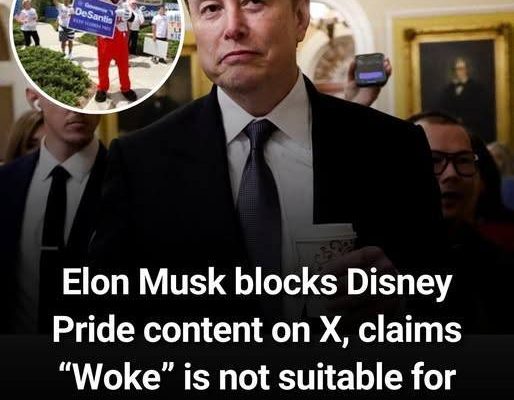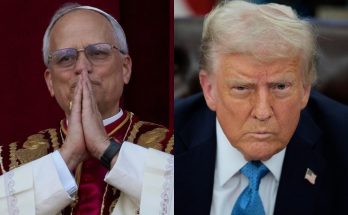Breaking: Disney Pride Content on X Is Blocked by Elon Musk, Who Says “Woke” Is Unsuitable for Kids
In a contentious decision that has drawn attention from social media users all around the world, Elon Musk said on his platform, X (previously Twitter), that he is preventing the promotion of Disney Pride content on the website. The content, which frequently features LGBTQ+ themes, is “woke” and inappropriate for young audiences, according to Musk, the CEO of X and Tesla. The ruling has spurred a great deal of discussion regarding the relationship between free speech, social media, and corporate branding.
The Controversy

The situation started when Musk addressed Disney’s recent Pride-themed activities in an unexpected post on X. Disney’s Pride content is being blocked by me. Musk tweeted, “Woke is not suitable for children,” alluding to the company’s increasing engagement in advancing LGBTQ+ inclusivity via its media channels.
Disney, which is well-known for its family-friendly image and popular films like Frozen, The Lion King, and the Toy Story series, has been including more and more LGBTQ+ characters and themes in its productions. Disney, for instance, has promoted Pride Month and LGBTQ+ inclusivity in recent years by incorporating LGBTQ+ characters into both animated shows and feature films.
But Musk’s most recent comments demonstrate how strongly he opposes what he calls “woke” culture. According to him, some themes—particularly those pertaining to LGBTQ+ issues—should not be included in children’s entertainment. The multibillionaire businessman also maintained that companies like Disney ought to concentrate on providing entertainment instead of utilizing their platforms to advance social or political causes.
Musk’s Opinion on “Woke” Society
Elon Musk has been speaking out more and more against what he perceives to be the emergence of “woke” thinking. He has voiced his worries about what he sees as the overreach of social justice movements, cancel culture, and political correctness in the media and business sectors using his public position.
Musk frequently uses the term “woke” to describe a focus on progressive social problems, especially those pertaining to sexual orientation, gender, and race. He contends that businesses should only concentrate on entertaining, not on political action or the advancement of contentious social causes. With his divisive remarks on issues like free speech, artificial intelligence, and the direction of technology, Musk has already voiced similar views in his private life.

It seems that his decision to prohibit Disney’s Pride content on X is the most recent in a string of actions aimed at distancing his platform from what he views as the detrimental effects of corporate activism.
The Response
Both ardent admirers and critics have responded to Musk’s news in different ways.
On the one hand, Musk’s detractors contend that his choice represents a risky attempt to restrict free speech, particularly when it comes to advancing acceptance and tolerance. Disney’s Pride programming has been swiftly defended by LGBTQ+ supporters, who stress the value of representation for underrepresented groups, especially for young people who might find it difficult to identify with mainstream media. Disney’s Pride efforts, in the opinion of these proponents, are a force for good, teaching kids that all families and identities are deserving of respect.
Maria Rivera, a spokesman for the LGBTQ+ advocacy group Equality for All, stated that Elon Musk is not getting the idea. Children will be more equipped to live in a society that celebrates diversity if they are exposed to more inclusive and diverse content. The goal of Disney’s Pride material is to provide every youngster an opportunity to see themselves represented and to convey more comprehensive stories; it is not “woke.”
However, Musk’s defenders contend that his choice stems from a need to preserve traditional values in children’s media. They contend that although sexuality and gender identity are significant topics, they might not be suitable for young audiences and that parents ought to have more influence over the content their kids are exposed to.
According to X critic Robert Allen, “parents should be the ones who decide what their children see, not companies trying to push a political agenda.” “Musk is correct to ban this content—it’s about allowing families to make their own decisions.”
Musk’s choice to prohibit Disney Pride content on X brings up more significant issues of corporate accountability, the role of social media platforms in content moderation, and the power of billionaires in influencing the media environment.
Musk has significant control over what shows up on the platform because he is the CEO of X. His actions will probably have repercussions, particularly in regards to online freedom of expression and content monitoring. Under Musk’s direction, X, a once-neutral social media network, has become more partisan, and many users are concerned that the platform is becoming closer to right-wing viewpoints.
At the same time, as the continuous discussion over “woke” culture unfolds both online and offline, Disney’s position on LGBTQ+ inclusivity and Pride programming may potentially come under increased public scrutiny. Disney, a multinational corporation, will probably have to tread carefully in this challenging environment as it tries to strike a balance between its corporate principles and the shifting demands of viewers everywhere.
In conclusion
A major turning point in the current cultural discussion about how media, social media, and businesses can promote social values is Elon Musk’s decision to ban Disney Pride content on X. Regardless of one’s opinion of Musk’s position, the matter raises more general questions about how media corporations affect public opinion, how much control social media platforms should have over content selection, and what obligation companies have to address social and political issues.
It will be interesting to observe how other public personalities, businesses, and platforms handle social and political content online as this topic develops and whether they decide to follow Musk’s example or go in a different direction. An continuing struggle over whether content is suitable for public consumption—and for whom—has been sparked by the expanding convergence of activism, entertainment, and technology.



